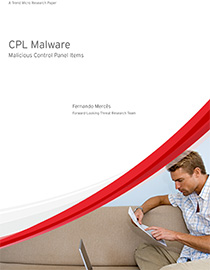CPL Malware Booms in Brazil
January 17, 2014
 View research paper: CPL Malware Malicious Control Panel Items
View research paper: CPL Malware Malicious Control Panel Items
The malicious files are zipped and arrive via emails that are supposedly sent by prominent Brazilian financial institutions. The file attachments make use of Portuguese and Brazilian terms and are aptly disguised as payment receipts or debt balances. Users who open the malicious .CPL files unknowingly execute banking malware. Once banking malware infiltrates a computer, it can redirect a victim to a malicious site, monitor a victim’s access to his banking sites, or even hijack his banking sessions.
Brazil is no stranger to these kinds of attacks. About 40 new malware target Brazilian banking customers on a daily basis. The creation of CPL malware just shows the broadening arsenal cybercriminals have at their disposal.
A typical .CPL file can host different kinds of apps. This flexibility allows cybercriminals to reengineer .CPL files in various ways—from droppers to rootkit installers. And since .CPL files pass off as generic Control Panel items, they make for great bait to lure unsuspecting victims to run malware on their devices and networks. Currently, Trend Micro has analyzed and detected more than 4 million malicious .CPL files.
CPL malware infections are preventable just as long as you note their characteristics. For example, .CPL files don’t commonly spread via networks. On the hand, the malicious .CPL files distributed in Brazil do. Our research paper, CPL Malware: Malicious Control Panel Items has more detailed information on the subject matter. With the right tools, knowledge, and awareness of cybercrime activities, you can minimize the impact of CPL Malware.
HIDE
Like it? Add this infographic to your site:
1. Click on the box below. 2. Press Ctrl+A to select all. 3. Press Ctrl+C to copy. 4. Paste the code into your page (Ctrl+V).
Image will appear the same size as you see above.
Recent Posts
- They Don’t Build the Gun, They Sell the Bullets: An Update on the State of Criminal AI
- How Unmanaged AI Adoption Puts Your Enterprise at Risk
- Estimating Future Risk Outbreaks at Scale in Real-World Deployments
- The Next Phase of Cybercrime: Agentic AI and the Shift to Autonomous Criminal Operations
- Reimagining Fraud Operations: The Rise of AI-Powered Scam Assembly Lines

 Complexity and Visibility Gaps in Power Automate
Complexity and Visibility Gaps in Power Automate AI Security Starts Here: The Essentials for Every Organization
AI Security Starts Here: The Essentials for Every Organization The AI-fication of Cyberthreats: Trend Micro Security Predictions for 2026
The AI-fication of Cyberthreats: Trend Micro Security Predictions for 2026 Stay Ahead of AI Threats: Secure LLM Applications With Trend Vision One
Stay Ahead of AI Threats: Secure LLM Applications With Trend Vision One